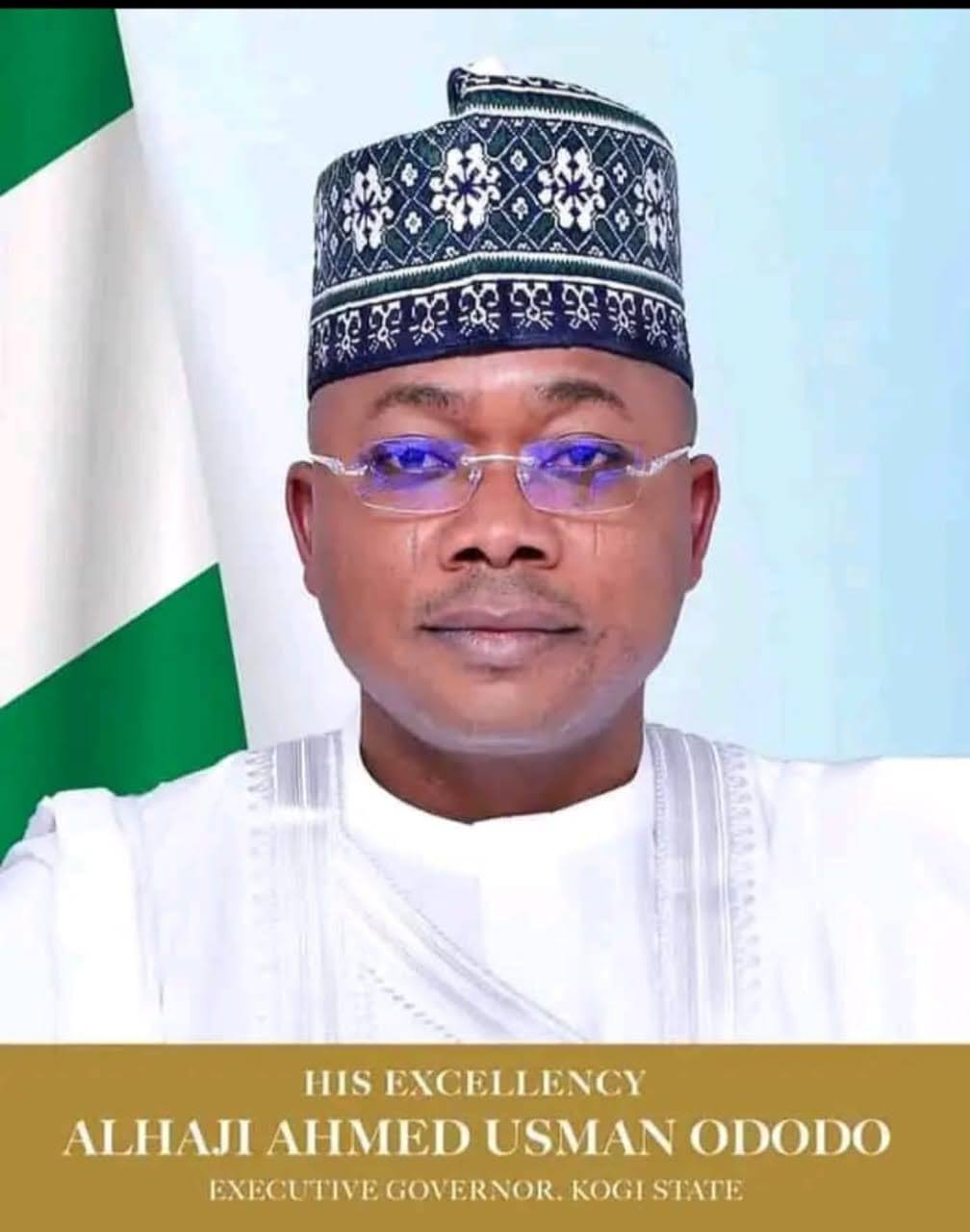
kogiflame.com

By Danlami Musa James.
Kogi State House of Assembly sometimes ago recommended the removal of the state Chief Judge, Justice Nasir Ajanah over an alleged gross misconduct including financial breaches.
This followed the adoption of the report and recommendations of the House committee on “Public Accounts on the State Auditor General’s Report on 2016 Financial Statements” in Lokoja.
Presenting the report, chairman of the committee, Alhaji Ahmed Mohammed (APC-Ankpa I) said said that the Chief Judge should step aside to defend himself over the alleged indictment by the Auditor-General of the state. Mohammed said the Public Accounts Committee was set up in line with Section 103 of the Constitution of the Federal Republic of Nigeria 1999 (as amended) at the plenary sitting of the House on Monday 24th December 2018.
The committee according to him, was mandated to investigate reported cases of financial breaches, noncompliance with financial regulations and poor handling of financial records by various Ministries, Departments and Agencies (MDAs) of the State Government.
He said that Kogi State Judiciary was said to have during the year ended December 2016, expended its budget above the approved limits provided in some sub heads as contained in the 2016 Appropriation Law to the tune of N7,574, 850 without the approval of virement application.
“It was also reported by the State Auditor-General that Kogi State High Court made huge cash withdrawal to the tune of N137,607,334.11). The cash was withdrawn from High Court Bank account in the year under review.
This transaction breached the provisions of chapter 6, regulation 632 which stipulates that “the use of cash for payment is hereby prohibited”, he said.
The committee therefore, recommenced the removal of the Chief Judge for gross misconduct or in the alternative, he should step aside pending his appearance before the House committee on Public Accounts to defend himself.
It also recommended that the Chief Registrar on the other hand, should be referred to the state Judicial Service Commission for disciplinary action and that the state government should commence immediate payment of judicial staff salaries.
However the action of the state assembly have been criticised from various quarters which included the legal practitioners, political parties and other stakeholders in the state.
According to Senior Advocate of Nigeria (SAN) J.S. Okutepa, did the Kogi State House of Assembly seek legal advice before embarking on this suicidal constitutional iniquity and insubordination.
“I do not think so. For if it did, it could have been properly guided. On the 17th of February 2012, the Supreme Court of Nigeria settled the point that no state House of Assembly and governor can remove the CJ of the state without going through NJC.
“This is what the supreme court said: What is relevant for determination of this issue is to fish out and examine the powers of the National Judicial Council in Paragraph 21 of Part 1 of the Third Schedule to the Constitution which reads- “21.
The National Judicial Council shall have power to – (a) recommend to the President from among the list of persons submitted to it by (i) the Federal Judicial Service Commission, persons for appointment to the offices of the Chief Justice of Nigeria… (ii) xxx (b) recommend to the President the removal from office of the Judicial Officers specified in sub-paragraph (a) of this paragraph and to exercise disciplinary control over such officers.
(c) recommend to the Governor from among the list of persons submitted to it by the State Judicial Service Commissions persons for appointment to the offices of the Chief Judges of the States and Judge of the High Courts of States, the Grand Kadis and Kadis of the Sharia Court of Appeal of the States and the Presidents and Judges of the Customary Courts of Appeal of the States.
(d) recommend to the Governors the removal from office of the judicial officers specified in sub-paragraph (c) of this paragraph, and to exercise disciplinary control over such officers.”
He said it was quite plain from the provisions of Paragraph 21 sub-paragraphs (c) and (d) of Part 1 of the Third Schedule to the Constitution of the Federal Republic of Nigeria 1999, that the National Judicial Council is the body that had been assigned the duty and responsibility of recommending to the Governors of the States of the Federation suitable persons for appointments to the offices of Chief Judges of the States and other Judicial Officers in the States.
In addition to its role in the appointment of Chief Judges of the States and other Judicial Officers, the same National Judicial Council is also empowered under Sub-paragraph (d) of Paragraph 21 to recommend to the Governors of the States the removal from office of the Chief Judges of the States and other Judicial Officers of the States and also to exercise disciplinary control over such Chief Judges of the States and other Judicial Officers of the States.
“Therefore, from these very clear provisions of the Constitution which are very far-from being ambiguous, the Governors of the States and the Houses of Assembly of the States cannot exercise disciplinary control touching the removal of Chief Judges of States or other Judicial Officers in the States.
According to him, “the case of HON. JUSTICE RALIAT ELELU-HABEEB & ANOR V. THE HON. ATTORNEY GENERAL OF THE FEDERATION & ORS(2012)LPELR-15515(SC) at 68-70 as per Mohammed JSC as he then was and later CJN.It is clear from the decision above that if the Kogi state house of assembly has sought guidance it should have spared the state of the decision it took.
He warned that kogi state should avoid being constantly in bad news for bad reasons stressing that there is no doubt that the NJC has been given powers in appointment and removal of CJ of the States. The Supreme Court dealt with this point in the most admirable fashion thus:
“Going back to Section 271(1) of the 1999 Constitution, it is also glaringly clear that the National Judicial Council has been given a role to play in the appointment of Chief Judges of the States where the Section states – “271(1) The appointment of a person to the office of a Chief Judge of a State shall be made by the Governor of the State on the recommendation of the National Judicial Council subject to the confirmation of the appointment by the House of Assembly of the State.
“It can be seen here again, although the Governor of a State has been vested with the power to appoint the Chief Judge of his own State, that power is not absolute as the Governor has to share the power with the National Judicial Council in recommending suitable persons and the State House of Assembly in confirming the appointment.
“It is in the spirit of the Constitution in ensuring checks and balances between the Three Arms of Government that the role of the Governor in appointing and exercising disciplinary control over the Chief Judge of his State is subjected to the participation of the National Judicial Council and the House of Assembly of the State in the exercise to ensure transparency and observance of the rule of law.
“The Cross-Appellant has made heavy weather on the interpretation and application of Section 292(1(a)(ii) of the 1999 Constitution which is said to have conferred unfettered powers on the Governor of Kwara State and the House of Assembly of Kwara State to remove the Chief Judge of Kwara State from office on an allegation of misconduct. The relevant Section of the Constitution states:-“292(1) A Judicial Officer shall not be removed from office or appointment before his age of retirement except in the following circumstances:- (a.) In case of- (i.) The Chief Justice of Nigeria (ii) The Chief Judge of a State, Grand Kadi of a Sharia Court of Appeal or President of a Customary Court of Appeal of a State, by the Governor acting on the address supported by two-thirds majority of the House of Assembly of the State, praying that he be so removed for his inability to discharge the functions of his office or appointment (whether arising from infirmity of mind or of body) or for misconduct or contravention of the code of conduct.” “The provisions of Section 292(1(a)(ii) of the Constitution above also deals with the power of the Governor to remove the Chief Judge of a State in conjunction with the House of Assembly of the State. Although, it is true as argued by the learned senior Counsel to the Cross-Appellant that the above Section 292(1) made no provision for the National Judicial Council to play any role in the removal of a Chief Judge of a State, the fact that the Council has a vital role to play in the appointment, removal and exercising control over a Chief Judge of a State under Section 271(1) of the Constitution and also under Paragraph 21 of Part 1 of the Third Schedule to the same Constitution is not at all in doubt. Furthermore, the conditions specified under Section 292(1)(a)(ii) of the Constitution for the exercise of the power of removal must be satisfied before such power can be validly exercised by both the Governor and the House of Assembly. This is because any exercise of power to remove a Chief Judge must be based on his:- “1. Inability to discharge the functions of office or appointment; 2. The inability to perform the functions of his office could arise from infirmity of the mind or of body 3. For misconduct or 4. The contravention of the code of conduct All these conditions or basis for the exercise of power to remove a State Chief Judge must be investigated and confirmed by credible evidence and placed before the Governor and the House of Assembly before proceeding to exercise their power of removal granted by the Section of the Constitution.
“For example the ground of removal for inability to perform the functions of his office or appointment cannot be ascertained and confirmed by the Governor or the House of Assembly in the absence of any input from the National Judicial Council under which supervision the Chief Judge discharges his functions as Judicial Officer and which body also is directly responsible for exercising disciplinary control over the said State Chief Judge.
“It is not difficult to see that for the effective exercise of the powers of removal of a Chief Judge of a State by the Governor and House Assembly, the first port of call by the Governor on his journey to remove a Chief Judge of the State shall be the National Judicial Council which is equipped with the personnel and resources to investigate the inability of the Chief Judge to discharge the functions of his office) the subject of disciplinary action of removal through the Committees of the Council and where the infirmity of the mind or body is involved) the services of a medical board to examine and submit appropriate report on the Chief Judge to be affected) could also avail the Council in the process of investigation.
“It is for the foregoing reasons that I hold the view that in the resolution of the issue at hand, the entire provisions of the 1999 Constitution in Sections 153(1)(i), (2), 271(1), 292(1)(a)(ii) and Paragraph 21 of Part 1 of the Third Schedule to the Constitution of the Federal Republic of Nigeria 1999 dealing with the appointments, removal and exercise of disciplinary control over Judicial Officers, must be read) interpreted and applied together in resolving the issue of whether or not the Governor of a State and the House of Assembly of a State can remove a Chief Judge of a State in Nigeria without any input of the National Judicial Council.
“This is because the combined effect of these provisions of the Constitution has revealed very clear intention of the framers of the Constitution to give the National Judicial Council a vital role to play in the appointment and removal of Judicial Officers by the Governors and Houses of Assembly of the State.
“In the result, I entirely agree with the two Courts below that having regard to these relevant provisions of the 1999 Constitution the Governor of Kwara State and the House of Assembly of the State cannot remove the Chief Judge of Kwara State from Office without the participation of the National Judicial Council in the exercise.
The Secretary Kogi Leaders Forum, Mallam Suleiman Abdullahi also in a statement condemned the action of the governor.
He noted that the proper processes for the removal of the Chief Judge of Kogi State, or any Chief Judge for that matter, can only be activated after the National Judicial Council, NJC, has investigated reported infractions against such a Judge, and found him wanting.
“Recent attempts to sidetrack due process and rule of law in the removal of Chief Judges in Kwara and Abia States, respectively, for instance, were nullified by the courts and such meddlesome conduct, rebuffed by the NJC.
Justice Raliat Elelu-Habeeb of Kwara State who was unceremoniously removed from office in 2009, was reinstated by the Supreme Court of Nigeria, in a unanimous ruling in February 2012.
He said the apex court ruled that the governor of Kwara State at the time, did not have the power to sack her from her position without recourse to and the approval of the NJC.
“In March 2018, the NJC recommended the compulsory retirement of Abia State Chief Judge, Justice Theresa Uzokwe, and the next in line of seniority, Justice Obisike Oji, who made himself available to be sworn-in as Acting Chief Judge, when the Abia State House of Assembly, purportedly sacked the substantive Chief Judge, Justice Uzokwe.
The NJC opined that Uzokwe and Oji were guilty of misconduct. He stressed that as a responsible citizens from a state which has produced nationally and globally acclaimed legal luminaries, “we are particularly pained by the brazen, reckless and mindless manner in which the rule of law is being jettisoned in our state.
“For the avoidance of doubt, Kogi State has produced two very respectable and activist Presidents of the Nigerian Bar Association, namely Chief Bayo Ojo, SAN, CON and Chief Joseph Bolorunduro Daudu, SAN, at various times in our recent history.
“Kogi State has equally produced three Attorneys-General and Ministers of Justice: Alhaji Abdullahi Ibrahim, SAN, CON (1997 to 1999); Chief Bayo Ojo, SAN, CON (2005 to 2007) and Alhaji Mohammed Bello Adoke, SAN, (2010 to 2015). “At the last count, Kogi State has about 30 Senior Advocates of Nigeria, SAN.
The aggregate concentration of legal human resource at this level and quality, is arguably in the bracket of the highest of any state in Nigeria. It should be presumed sacrilegious therefore if such lawlessness is being perpetrated in Kogi State.
He therefore called on the Nigerian Bar Association and Legal Practitioners Privileges Committee, LPPC of the NBA, to interrogate the activities of Barrister Mohammed Ibrahim, the Kogi State Attorney General and Commissioner for Justice, with a view to sanctioning him appropriately for defaulting in the proper guidance of his Principal, with particular reference to the matter under reference, especially against the backdrop of overwhelming precedence.
He said that the attempt to impugn the integrity of the judiciary in Kogi State and ridicule the institution in the public eye, must not be allowed to stand.
Also reacting, the Kogi State chapter of the Social Democratic Party, (SDP), warned against unconstitutional removal of the Chief Judge of Kogi State, Justice Nasiru Ajanah when his tenure is not yet over.
In a statement signed by the state chairman of the party, Alhaji Mouktar Atimah, recalled that similar removals done where reversed by the Supreme Court, saying that this will not also stand.
According to the chairman, this is another constitutional crisis looming in Kogi State and called on the Federal Government to quick wade in before it delegates further.
The statement which reads in part said “It has come to the notice of our great party that there is a looming constitutional crisis in Kogi state.The executive Governor of the state Yahaya Bello is bent on removing the state Chief Judge Hon Nasir Ajana from office.
” It will be interesting to note that for the past six months there has been a lot of brouhaha between the executive and the judiciary.To the extent that a case involving the two arms of government was stopped by the executive for an out of Court settlement.
“As we speak today, the state judicial system has been on strike for about five months and no attempt to resolve the crisis and make justice dispensation to the common man difficult.
“We wish to draw the attention of the whole world that it will be unconstitutional to remove the Chief Judge when his tenure is not yet over.It would be recalled that similar removals done where reversed by the Supreme Court.
“We as a party is calling on the Federal Government to reverse this decision and declare a State of emergency on Kogi state.Since the present government does not know that Separation of power is one of the key ingredients for democracy to thrive.








